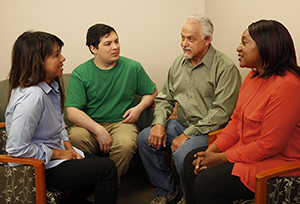Chronic Lung Disease: Notes for Family and Friends
Being close to someone with chronic lung disease will likely mean some changes in your life. As your loved one copes with chronic lung disease, you may be asked to be a helper, caregiver, or source of support.
Helpful tips
Here are general tips to follow:
-
Learn as much as you can about chronic lung disease. This will help you know what to expect. It will also show you ways that you can help.
-
Talk with your loved one’s healthcare team. Ask any questions you have. Make sure you understand your role in treatment.
-
Spend time with your loved one. Take time to talk and to do things you both enjoy.
-
Join a local or online support group. Contact the American Lung Association Patient & Caregiver Network or the COPD Foundation at www.copdfoundation.org or 866-731-2673.

Tips for caregivers
Caregivers' tips include:
-
Keep in mind that you can’t take good care of someone else if you don’t take care of yourself, too. Take breaks when you need them. Thinking about your own needs isn't selfish; it’s vital.
-
You may want to do things for your loved one to help save time. But let them do some things for themself. This can help them feel involved and independent. Encourage your loved one to stick with old hobbies or try new ones. And ask friends to visit if your loved one agrees.
-
Watch for signs of depression in your loved one. These include trouble sleeping and loss of interest in activities, food, or people. They also include talk about feeling hopeless or very sad. If you see these signs, tell their healthcare provider.
-
Watch for depression in yourself. If you feel sad, guilty, tired, hopeless, or helpless most of the time, talk with your healthcare provider. Depression can and should be treated.
Online Medical Reviewer:
Chris Southard RN
Online Medical Reviewer:
Jessica Gotwals RN BSN MPH
Online Medical Reviewer:
Rajadurai Samnishanth Researcher
Date Last Reviewed:
9/1/2024
© 2000-2025 The StayWell Company, LLC. All rights reserved. This information is not intended as a substitute for professional medical care. Always follow your healthcare professional's instructions.